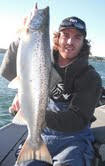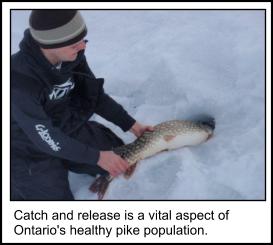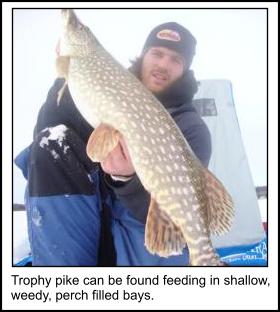|

Pike
Fishing
Ontario Ice Fishing Huts and Rentals
|
 Ice
More Northern Pike Ice
More Northern Pike
By: Tyler Dunn
Tyler Dunn Guiding
Winter has fallen upon us and anglers throughout
Ontario have begun to switch gears from the open
water to hard water. Chasing northern pike or
should I say, trophy northern pike has become an
addiction for me on the ice. A few encounters
with big pike while perch fishing and suddenly I
had an unsatisfied appetite for the toothy fish.
Once I put a few patterns and presentations
together it all seemed to make sense. The
following tips are offered to help you land more
pike through the ice anywhere in Ontario where
pike are available.
 Location Location
Winter is the time of year northern pike become
much easier to find compared to the hot summer
months. Not only do pike move into shallow bays
with the colder water temperatures but winter
pike especially like bays that still have
remaining green weeds. These bays are beneficial
to a pike in two ways. They provide cover and
they provide food. The healthy green weed growth
brings in baitfish like perch. They too are
feeding on the smorgasbord of minnows and
invertebrates found in the healthy, green weeds.
I like to set tip-ups suspended in the deepest
part of a shallow bay or along the edge of the
first or maybe only drop-off. First and last ice
are typically the best times throughout the
entire winter season with the last 2-3 weeks of
ice being exceptionally well because of the
majority of fish moving into pre-spawn areas.
Set Lines
A set or still line is definitely the most
productive method for catching pike consistently
through the ice. When I put a set line out for
pike it is almost always under a tip-up. There
are several different styles of tip-ups but what
they all offer is a magnificent drag- free
system once a fish
 strikes the bait. This
drag-free system is especially important when
targeting northern pike because they are
notorious for striking baits and keeping them
clenched in their jaws while swimming away. If
tension is felt, pike have a tendency to drop
the bait. This is why it is so important to get
over to your tip-up once your flag is triggered.
To set the hook just firmly, tighten the line.
This is all the pressure you will need to drive
the hooks home. Refrain from the exaggerated
hook set in fear of pulling the bait right out
of the pikes jaw. Another mistake often made by
anglers is to let the fish take line and wait
for it to stop to eat it. During that time you
wait, they often drop the bait or completely
swallow it. The quicker hook set not only gives
you a better chance at hooking the fish but it
also gives the fish a greater chance at
survival if released. The hook system I use is a
simple quick strike rig that consists of 40-60
pound fluorocarbon with 2 trebles matching the
size of the bait used. I have used braid as a
leader and although it has landed some big fish,
I have experienced bite offs. When deciding on
bait there is much to consider before choosing.
Obviously your first task should be checking the
regulations to know exactly what is legal to
use. Common baits in any pike ingested waters
are smelt, shiners, suckers and ciscoes. There
has been much debate on which is better, dead or
alive. Personally, I prefer dead but there are
days throughout winter when live bait has out
fished dead. These are the days I find the pike
extremely active attacking my jigging
presentations. Often these jigging presentations
are not even intended for pike but instead
perch. strikes the bait. This
drag-free system is especially important when
targeting northern pike because they are
notorious for striking baits and keeping them
clenched in their jaws while swimming away. If
tension is felt, pike have a tendency to drop
the bait. This is why it is so important to get
over to your tip-up once your flag is triggered.
To set the hook just firmly, tighten the line.
This is all the pressure you will need to drive
the hooks home. Refrain from the exaggerated
hook set in fear of pulling the bait right out
of the pikes jaw. Another mistake often made by
anglers is to let the fish take line and wait
for it to stop to eat it. During that time you
wait, they often drop the bait or completely
swallow it. The quicker hook set not only gives
you a better chance at hooking the fish but it
also gives the fish a greater chance at
survival if released. The hook system I use is a
simple quick strike rig that consists of 40-60
pound fluorocarbon with 2 trebles matching the
size of the bait used. I have used braid as a
leader and although it has landed some big fish,
I have experienced bite offs. When deciding on
bait there is much to consider before choosing.
Obviously your first task should be checking the
regulations to know exactly what is legal to
use. Common baits in any pike ingested waters
are smelt, shiners, suckers and ciscoes. There
has been much debate on which is better, dead or
alive. Personally, I prefer dead but there are
days throughout winter when live bait has out
fished dead. These are the days I find the pike
extremely active attacking my jigging
presentations. Often these jigging presentations
are not even intended for pike but instead
perch.
 Jigging Presentations Jigging Presentations
Pike are probably most famous for their
extremely aggressive behaviour. Even during the
cold winter months, northern pike are ferocious
eaters. With this in mind there are times on the
ice when I decide to jig. My underwater camera
and flasher are the two tools that give me a
visual on how the fish are reacting to my bait.
These tools show exactly how aggressive the fish
are and give me an idea of what lures and at
what speeds to present them. As far as lures go,
there is a vast variety available for pike but
honestly the sky is the limit. Any open water
lure that can be presented in a vertical manner
could possibly be a phenomenal pike lure on the
hard water. Hard baits with loud rattles such as
lipless crank baits have quickly earned
themselves a permanent spot in my pike arsenal.
These open water baits sink, rattle (rather
loud) and have a subtle side to side action when
jigged. More commonly used baits are large
Jigging Rapalas, Jigging Shad Raps, Williams
jigging spoons and various tube jigs. These are
tipped with either a head, half or whole smelt
or shiner. Longer rods (30”+) that have soft
tips with backbone similar to a lake trout rod
are good matches for icing winter pike. Although
tip-ups will usually take more fish, catching
active pike through the ice on a jig rod is an
experience all in its own. Northern and Southern
Ontario both have some of the best pike fishing
North America has to offer. Take advantage of
arguably the most aggressive fish, freshwater
has to offer.
|